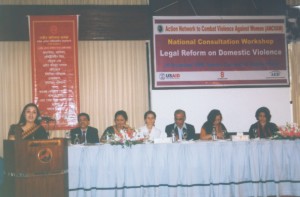Law Event
'Legal reform on domestic violence'
Shaila Shahid
 Domestic violence in Bangladesh is largely considered as private matter. The life of most of the women in Bangladesh continues to be dominated by a patriarchal social system. Women are customarily treated as inferior members of the society. As a result, Bangladeshi women subjected to domestic violence are in a very vulnerable position and seeking justice also can often lead to further abuse to them. In this phenomena sspeakers at a workshop underscored the need for formulating a specific law on domestic violence. "There is no specific law on domestic violence in the country, while India has already enacted a law on it," participants agreed. The national consultation workshop on 'Legal reform on domestic violence' was organised by Action Network to Combat Violence Against Women (ANCVAW) at the Spectra Convention Centre in the city.
Domestic violence in Bangladesh is largely considered as private matter. The life of most of the women in Bangladesh continues to be dominated by a patriarchal social system. Women are customarily treated as inferior members of the society. As a result, Bangladeshi women subjected to domestic violence are in a very vulnerable position and seeking justice also can often lead to further abuse to them. In this phenomena sspeakers at a workshop underscored the need for formulating a specific law on domestic violence. "There is no specific law on domestic violence in the country, while India has already enacted a law on it," participants agreed. The national consultation workshop on 'Legal reform on domestic violence' was organised by Action Network to Combat Violence Against Women (ANCVAW) at the Spectra Convention Centre in the city.
The speakers said women are repressed in their families in various ways. "But most of the victims do not know that it is a criminal offence," they added. ANCVAW Chairperson Syed Nurul Alam said in his welcome speech, "We should create awareness among people about domestic violence so that an effective law can be formulated." The commission should examine the draft elaborately and accept opinions from all stakeholders before its enactment, he added. Susan De Ward, Chief of Party, AED/BHRAP also addressed the workshop. She said that urgent action is necessary to combat against domestic violence. Referring the Draft Bill on Domestic Violence she opined that although The Draft DV Bill is an important step towards the legal recognition of domestic violence in Bangladesh but legal reform is not the only issue to overcome. A massive awareness is necessary as domestic violence is underpinning in the social system.
Advocate Fawzia Karim Firoz, immediate past president of BNWLA and Barrister Sara Hossain presented two keynote papers at the workshop. Advocate Firoz presented different existing legal remedies of domestic violence. She said that domestic violence is one of the most widespread and least recognized human rights abuses in the world and Bangladesh is no exception in this. The Penal Code of Bangladesh contains provisions that protect women from various forms of violence, although it does not specifically define 'sexual assault'. Also family matters are not covered by Penal Code. She said in her speech that access to justice is very much important for any rural women to seek justice or getting remedy. Hence in this context BNWLA proposed the Arbitration Council under Family Court Ordinance 1961, The Village Court under Village Court Ordinance 1985 and The Conciliation of Disputes (Municipal Areas) Ordinance 1979 can deal the matter regarding domestic violence other than the Family Court established under section 4 of Family Court Ordinance 1985 which has given the authority to try the domestic violence matter in the proposed Bill.
Barrister Sara reviewed the whole draft Bill and in her view, although some loopholes exist in the proposed Bill but a holistic approach has been taken to address domestic violence in the draft law. Referring Section (2) of the draft Bill that this law shall extend to whole Bangladesh, she raised question whether Chittagong Hill Tracts will be under the purview of its jurisdiction as Family Court Ordinance 1985 is not applicable to CHT.
Hence, it is important that this kind of barrier should be removed to ensure justice, she opined.
The consultation was divided into three simultaneous workshops from where participants came out with a set of recommendations to bring changes in the proposed draft Bill on domestic violence. The first session titled "The jurisdiction of the proposed Domestic Violence Act " was chaired by Dr. Nusrat Ameen, Assistant Professor, Law Department, Dhaka University. The second session was on the remedies available under the proposed Bill and the third was other remedies of domestic violence.
The final recommendations of the national consultation was presented by Dr. Faustina Perreira from ASK. She also discussed about different future steps that need to be taken to combat domestic violence further. Ms. Nasreen Begum, Joint Secretary, Ministry of Law, Justice chaired the concluding session of the workshop and Parliamentary Affairs, while Md. Imam Hasnat, Executive Director of Manabik Shahjjo Shangstha gave his vote of thanks to all for participating in the national consultation.
Law Desk.